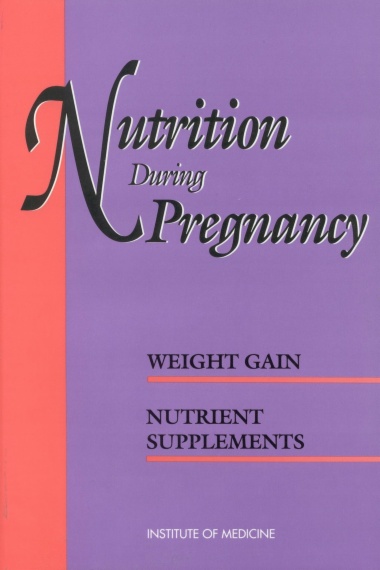In Part I of Nutrition During Pregnancy, the authors call for revisions in recommended weight gains for pregnant women. They explore relationships between weight gain during pregnancy and a variety of factors (e.g., the mother's weight for height before pregnancy) and places this in the context of the health of the infant and the mother. They present specific target ranges for weight gain during pregnancy and guidelines for proper measurement.
Part II addresses vitamin and mineral supplementation during pregnancy, examining the adequacy of diet in meeting nutrient needs during pregnancy and recommending specific amounts of supplements for special circumstances. It also covers the effects of caffeine, alcohol, cigarette, marijuana, and cocaine use and presents specific research recommendations.
- Cover
- Front Matter
- 1 Summary
- Part I Nutritional Status and Weight Gain
- 2 Introduction
- 3 Historical Trends in Clinical Practice, Maternal Nutritional Status, and the Course and Outcome of Pregnancy
- 4 Assessment of Gestational Weight Gain
- 5 Total Amount and Pattern of Weight Gain: Physiologic and Maternal Determinants
- 6 Body Composition Changes During Pregnancy
- 7 Energy Requirements, Energy Intake, and Associated Weight Gain During Pregnancy
- 8 Effects of Gestational Weight Gain on Outcome in Singleton Pregnancies
- 9 Weight Gain in Twin Pregnancies
- 10 Causality and Opportunities for Intervention
- Part II Dietary Intake and Nutrient Supplements
- 11 Introduction
- 12 Assessment of Nutrient Needs
- 13 Dietary Intake During Pregnancy
- 14 Iron Nutrition During Pregnancy
- 15 Trace Elements
- 16 Calcium, Vitamin D, and Magnesium
- 17 Vitamins, A, E, and K
- 18 Water-Soluble Vitamins
- 19 Protein and Amino Acids
- 20 Substance Use and Abuse During Pregnancy
- 21 Periconceptional Vitamin Supplementation and Neural Tube Defects
- Appendixes
- Acronyms
- Glossary
- Index

